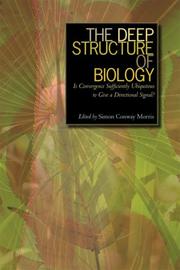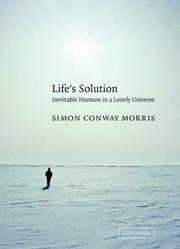| Listing 1 - 10 of 15 | << page >> |
Sort by
|

ISBN: 1283260247 9786613260246 1599471728 9781599471723 9781599471389 1599471388 9781283260244 661326024X Year: 2008 Publisher: West Conshohocken, Pa. Templeton Foundation Press
Abstract | Keywords | Export | Availability | Bookmark
 Loading...
Loading...Choose an application
- Reference Manager
- EndNote
- RefWorks (Direct export to RefWorks)
Twelve renowned scientists and theologians offer penetrating insights into the evolution dialogue in The Deep Structure of Biology. Each considers whether the orthodox model of evolution is sufficient and offers his/her own perspective on evolution and biology. Essays include: Chance and Necessity in Evolution Green Plants as Intelligent Organisms Canny Corvoids and Political Primates: A Case for Convergent Evolution in Intelligence Social and Cultural Evolution in the Ocean: Convergences and Contrasts with Terrestrial Systems
Convergence (Biology) --- Biology --- Phylogeny --- Convergence (Biology).
Book
Abstract | Keywords | Export | Availability | Bookmark
 Loading...
Loading...Choose an application
- Reference Manager
- EndNote
- RefWorks (Direct export to RefWorks)
Book
ISBN: 0262354187 0262354179 9780262354189 9780262354172 Year: 2019 Publisher: Cambridge : MIT Press,
Abstract | Keywords | Export | Availability | Bookmark
 Loading...
Loading...Choose an application
- Reference Manager
- EndNote
- RefWorks (Direct export to RefWorks)
Book
ISBN: 1599474654 9781599474656 9781599474649 1599474646 Year: 2015 Publisher: West Conshohocken, PA
Abstract | Keywords | Export | Availability | Bookmark
 Loading...
Loading...Choose an application
- Reference Manager
- EndNote
- RefWorks (Direct export to RefWorks)
How did human beings acquire imaginations that can conjure up untrue possibilities? How did the Universe become self-aware? In The Runes of Evolution, Simon Conway Morris revitalizes the study of evolution from the perspective of convergence, providing us with compelling new evidence to support the mounting scientific view that the history of life is far more predictable than once thought. A leading evolutionary biologist at the University of Cambridge, Conway Morris came into international prominence for his work on the Cambrian explosion (especially fossils of the Burgess Shale) and evolution
Evolution (Biology) --- Philosophy. --- Convergence (Biology) --- Biology --- Phylogeny
Book
ISBN: 9780262356596 0262356597 9780262043397 0262356600 9780262356602 Year: 2020 Publisher: Cambridge : The MIT Press,
Abstract | Keywords | Export | Availability | Bookmark
 Loading...
Loading...Choose an application
- Reference Manager
- EndNote
- RefWorks (Direct export to RefWorks)
Can we can use the patterns and processes of convergent evolution to make inferences about universal laws of life, on Earth and elsewhere In this book, Russell Powell investigates whether we can use the patterns and processes of convergent evolution to make inferences about universal laws of life, on Earth and elsewhere. Weaving together disparate philosophical and empirical threads, Powell offers the first detailed analysis of the interplay between contingency and convergence in macroevolution, as it relates to both complex life in general and cognitively complex life in particular. If the evolution of mind is not a historical accident, the product of convergence rather than contingency, then, Powell asks, is mind likely to be an evolutionarily important feature of any living world Stephen Jay Gould argued for the primacy of contingency in evolution. Gould's "radical contingency thesis" (RCT) has been challenged, but critics have largely failed to engage with its core claims and theoretical commitments. Powell fills this gap. He first examines convergent regularities at both temporal and phylogenetic depths, finding evidence that both vindicates and rebuffs Gould's argument for contingency. Powell follows this partial defense of the RCT with a substantive critique. Among the evolutionary outcomes that might defy the RCT, he argues, cognition is particularly important--not only for human-specific issues of the evolution of intelligence and consciousness but also for the large-scale ecological organization of macroscopic living worlds. Turning his attention to complex cognitive life, Powell considers what patterns of cognitive convergence tell us about the nature of mind, its evolution, and its place in the universe. If complex bodies are common in the universe, might complex minds be common as well.
Evolution (Biology) --- Convergence (Biology) --- Philosophy. --- Biology --- Phylogeny
Book
ISBN: 3515020845 9783515020848 Year: 1975 Publisher: Mainz: Akademie der Wissenschaften und der Literatur,
Abstract | Keywords | Export | Availability | Bookmark
 Loading...
Loading...Choose an application
- Reference Manager
- EndNote
- RefWorks (Direct export to RefWorks)
Paramesochridae --- Convergence (Biology) --- Crustacea --- Muscles --- Kliopsyllus spiniger
Book
ISBN: 0674279514 Year: 1971 Publisher: Cambridge, Mass. Harvard University Press
Abstract | Keywords | Export | Availability | Bookmark
 Loading...
Loading...Choose an application
- Reference Manager
- EndNote
- RefWorks (Direct export to RefWorks)
Animal psychology and neurophysiology --- Fishes --- Convergence (Biology) --- Deep-sea fishes --- Convergence (Biology). --- Deep-sea fishes. --- Fishes.

ISBN: 1107138132 1107385873 1280421584 9786610421589 0511205775 0511169736 0511078730 0511308523 051153549X 0511077165 9780511078736 0511075626 9780511075629 9780511077166 9780511535499 9780521827041 0521827043 0521827043 9780521603256 0521603250 Year: 2003 Publisher: Cambridge, UK New York Cambridge University Press
Abstract | Keywords | Export | Availability | Bookmark
 Loading...
Loading...Choose an application
- Reference Manager
- EndNote
- RefWorks (Direct export to RefWorks)
The assassin's bullet misses, the Archduke's carriage moves forward, and a catastrophic war is avoided. So too with the history of life. Re-run the tape of life, as Stephen J. Gould claimed, and the outcome must be entirely different: an alien world, without humans and maybe not even intelligence. The history of life is littered with accidents: any twist or turn may lead to a completely different world. Now this view is being challenged. Simon Conway Morris explores the evidence demonstrating life's almost eerie ability to navigate to a single solution, repeatedly. Eyes, brains, tools, even culture: all are very much on the cards. So if these are all evolutionary inevitabilities, where are our counterparts across the galaxy? The tape of life can only run on a suitable planet, and it seems that such Earth-like planets may be much rarer than hoped. Inevitable humans, yes, but in a lonely Universe.
Evolution (Biology). --- Philosophy. --- Evolution (Biology) --- Convergence (Biology) --- Biology --- Phylogeny --- Convergence (Biology).
Book
ISBN: 9780823265244 0823265242 9780823265251 0823265250 Year: 2015 Publisher: New York Fordham University Press
Abstract | Keywords | Export | Availability | Bookmark
 Loading...
Loading...Choose an application
- Reference Manager
- EndNote
- RefWorks (Direct export to RefWorks)
Exploring the broad implications of evolutionary theorist Lynn Margulis's work, this collection brings together specialists across a range of disciplines, from paleontology, molecular biology, evolutionary theory, and geobiology to developmental systems theory, archaeology, history of science, cultural science studies, and literature and science. Addressing the multiple themes that animated Margulis's science, the essays within take up, variously, astrobiology and the origin of life, ecology and symbiosis from the microbial to the planetary scale, the coupled interactions of earthly environments and evolving life in Gaia theory and earth system science, and the connections of these newer scientific ideas to cultural and creative productions. Dorion Sagan acquaints the reader with salient issues in Lynn Margulis's scientific work, the controversies they raised, and the vocabulary necessary to follow the arguments. Sankar Chatterjee synthesizes several strands of current theory for th e origin of life on earth. James Strick tells the intertwined origin stories of James Lovelock's Gaia hypothesis and Margulis's serial endosymbiosis theory. Jan Sapp explores the distinct phylogenetic visions of Margulis and Carl Woese. Susan Squier examines the epigenetics of embryologist and developmental biologist C.H. Waddington. Bruce Clarke studies the convergence of ecosystem ecology, systems theory, and science fiction between the 1960s and the 1980s. James Shapiro discusses the genome evolution that results not from random changes but rather from active cell processes. Susan Oyama shows how the concept of development balances an over-emphasis on genetic coding and other deterministic schemas. Christopher Witmore studies the ways in which a concentrated animal feeding operation, or CAFO, mixes up natural resources, animal lives, and human appetites. And Peter Westbroek brings the insights of earth system science toward a new worldview essential for a proper response to global c hange.
Convergence (Biology) --- Gaia hypothesis --- Biodiversity --- Evolution (Biology) --- Biological Evolution --- Philosophy
Book
ISBN: 1283302896 9786613302892 0262298872 9780262298872 9780262298001 0262298007 9780262016421 0262016427 9781283302890 6613302899 Year: 2011 Publisher: Cambridge, MA MIT Press
Abstract | Keywords | Export | Availability | Bookmark
 Loading...
Loading...Choose an application
- Reference Manager
- EndNote
- RefWorks (Direct export to RefWorks)
An analysis of convergent evolution, from molecules to ecosystems, demonstrating the limited number of evolutionary pathways available to life.
| Listing 1 - 10 of 15 | << page >> |
Sort by
|

 Search
Search Feedback
Feedback About UniCat
About UniCat  Help
Help News
News